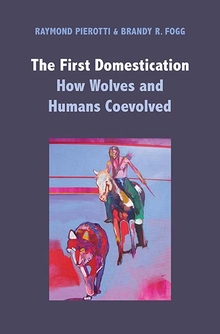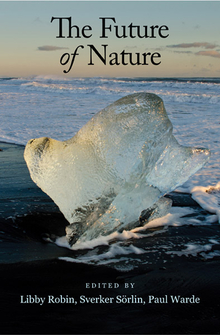The First Domestication
WARNING
You are viewing an older version of the Yalebooks website. Please visit out new website with more updated information and a better user experience: https://www.yalebooks.com
How Wolves and Humans Coevolved
Raymond Pierotti and Brandy R. Fogg
A riveting look at how dog and humans became best friends, and the first history of dog domestication to include insights from indigenous peoples
In this fascinating book, Raymond Pierotti and Brandy Fogg change the narrative about how wolves became dogs and in turn, humanity’s best friend. Rather than describe how people mastered and tamed an aggressive, dangerous species, the authors describe coevolution and mutualism. Wolves, particularly ones shunned by their packs, most likely initiated the relationship with Paleolithic humans, forming bonds built on mutually recognized skills and emotional capacity.
This interdisciplinary study draws on sources from evolutionary biology as well as tribal and indigenous histories to produce an intelligent, insightful, and often unexpected story of cooperative hunting, wolves protecting camps, and wolf-human companionship. This fascinating assessment is a must-read for anyone interested in human evolution, ecology, animal behavior, anthropology, and the history of canine domestication.
In this fascinating book, Raymond Pierotti and Brandy Fogg change the narrative about how wolves became dogs and in turn, humanity’s best friend. Rather than describe how people mastered and tamed an aggressive, dangerous species, the authors describe coevolution and mutualism. Wolves, particularly ones shunned by their packs, most likely initiated the relationship with Paleolithic humans, forming bonds built on mutually recognized skills and emotional capacity.
This interdisciplinary study draws on sources from evolutionary biology as well as tribal and indigenous histories to produce an intelligent, insightful, and often unexpected story of cooperative hunting, wolves protecting camps, and wolf-human companionship. This fascinating assessment is a must-read for anyone interested in human evolution, ecology, animal behavior, anthropology, and the history of canine domestication.
Raymond Pierotti is professor of ecology and evolutionary biology at the University of Kansas. He specializes in evolutionary and behavioral ecology of monogamous birds and mammals, and scientific aspects of indigenous traditional knowledge. He lives in Oskaloosa, KS. Brandy R. Fogg received an undergraduate degree in environmental studies and a master’s degree in Indigenous Nations Studies at the University of Kansas. She lives in Overland Park, KS.
“Offers intelligent but subtle insights that have generally been overlooked by others writing about dog domestication, including myself. The closing chapter in particular is brilliant.”—Pat Shipman, author of The Invaders: How Humans and Their Dogs Drove Neanderthals to Extinction and The Animal Connection: A New Perspective on What Makes Us Human
“The domestic dog is absolutely unique in its relationship to humans. Famously loyal, fierce in protection, no other animal is such a friend, partner, guardian, guide, and family member. How dogs got to be dogs, how they brought their wolf traits into our home, and how humans have been in many ways reliant on dogs for survival and for our global spread—this is one of the most fascinating stories in the world. It is well told in these pages; this is a deep and insightful book.”—Carl Safina, author of Beyond Words: What Animals Think and Feel
“Fabulous! This book is an inspiration, and a highly readable scientific and scholarly work. It is a must-read for anyone who has ever loved a canid, and all who may not yet have done so.”—Bernd Heinrich, author of Mind of the Raven: Investigations and Adventures with Wolf-Birds
“In their landmark book, the authors begin by clearly outlining the material they want to cover and how they will go about doing it. They write, ‘In our efforts to produce a significant new contribution to a crowded field, we looked to a source that has been largely ignored in investigations of the evolution of humans and their ecological relationships with other species: the solid information contained within accounts from Indigenous peoples around the world.’ And the authors, who bring expertise in the wide-ranging fields they cover in their interdisciplinary analyses, do just this with remarkable skill and clear and easy to read prose.”—Marc Bekoff, Animal Emotions, Psychology Today
"An in-depth and extremely satisfying study of one of the oldest subjects of human society: the millennia-old partnership of Homo sapiens and Canis familiaris."—Steve Donoghue, Open Letters Monthly
"An outstanding book because of the care with which existing data are treated and presented and its encyclopedic scope."—Marc Bekoff, Quarterly Review of Biology
ISBN: 9780300226164
Publication Date: November 28, 2017
Publication Date: November 28, 2017
344 pages, 6 1/8 x 9 1/4
25 b/w illus.
25 b/w illus.








